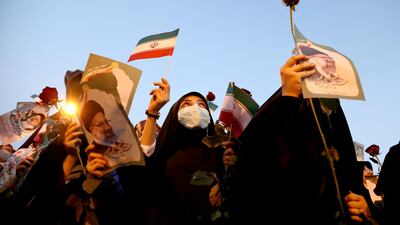Ahmad Vahidi and Mohsen Rezai are veterans of Iran’s political scene and long-time players in its effort to build proxy militia forces elsewhere in the Middle East.
Both men, who were confirmed to Cabinet on Wednesday, were selected by the recently elected hardliner President Ebrahim Raisi.
They will work closely with Foreign Minister Hossein Amir-Abdollahian, who has also held high-ranking roles since the 1990s.
The appointments have drawn international condemnation for their connections to Iranian proxies in the region, notably Hezbollah.
Mr Vahidi and Mr Rezai are believed to have been involved in the 1994 bombing of the Argentine Israelite Mutual Association (AMIA), a Jewish community organisation in Buenos Aires. The blast, which killed 85 people and injured hundreds more, remains the deadliest terrorist atrocity on Argentinian soil.
In 2006, Argentina accused Tehran of orchestrating the attack, in which a Lebanese man blew himself up in a van packed with explosives.
One year later, Interpol approved Red Notice alerts for Mr Vahidi, Mr Rezai and four other men suspected of involvement in the incident.
Ahmad Vahidi

The government of Argentina issued a scathing condemnation of Mr Vahidi’s new role.
Its Foreign Ministry said the move was an “affront” to the country’s justice system and to the victims of the attack.
Red Notice notwithstanding, this is not Mr Vahidi’s first ministerial stint.
In 2009, he became Defence Minister under president Mahmoud Ahmadinejad. His appointment prompted Interpol officials to travel to Iran, but it later issued a clarification, saying the Red Notice did not constitute an international warrant for Mr Vahidi’s arrest. Rather, it meant he was wanted for questioning by an Interpol member state.
“Interpol’s role has been to notify the international law enforcement community that multiple arrest warrants were issued by an Argentinian judge, including one for Mr Vahidi,” its 2009 statement read.
“Interpol’s General Assembly in Marrakesh in November 2007 endorsed the issuance of Red Notices for six out of nine individuals, with one issued for Mr Vahidi at a time when he was already serving as Iran’s deputy defence minister.”
Argentina and Iran are both members of Interpol.
In the 1980s, Mr Vahidi joined the overseas military arm of the Islamic Revolutionary Guard Corps, known as the Quds force.
Israel’s Foreign Ministry condemned his appointment.
“This is the face of the new terror government in Iran,” it said in a statement.
Mohsen Rezai
Mr Rezai commanded the IRGC for much of the bloody Iran-Iraq war of the 1980s, in which about one million people were killed.
His appointment to the position of Vice President of Economic Affairs comes after Ayatollah Ali Khamenei warned economists in Tehran they should assume US sanctions would remain in force.
During the Iran-Iraq war, the IRGC created its first allied militias outside the country. They included Iraq’s Badr Organisation, which was to play a key role during the sectarian violence that erupted there after the US invasion in 2003.
Mr Rezai is also mentioned in the 2007 Interpol notice.
A well-known figure in Iranian politics, he has stood for office several times since 2005.
He left the post as commander of the IRGC in 1997, after a dispute with the reformist government of Mohammad Khatami.
More recently, he railed against the government of Hassan Rouhani, saying an “infiltration network” had seeded it with corrupt and incompetent figures.
Hossein Amir-Abdollahian

Mr Amir-Abdollahian will replace Javad Zarif as foreign minister.
He was appointed to the role of deputy foreign minister in 2011, under Mahmoud Ahmadinejad, and formerly served as adviser for international affairs to Ali Larijani, the former Parliament Speaker.
Mr Amir-Abdollahian is known as a hardliner. Like Mr Vahidi, he has strong relationships with Hezbollah and the IRGC, and was close to Qassem Suleimani, the IRGC Quds Force commander who was assassinated last year.
He also served as ambassador to Bahrain and as deputy foreign minister for Arab and African affairs.













